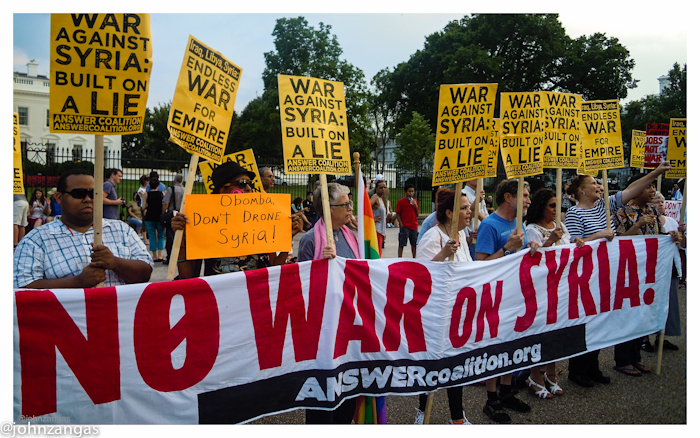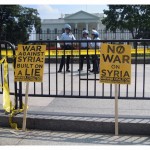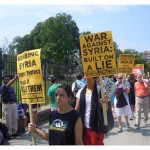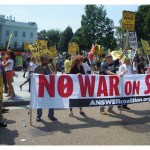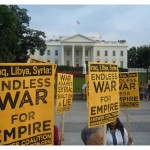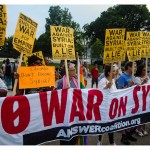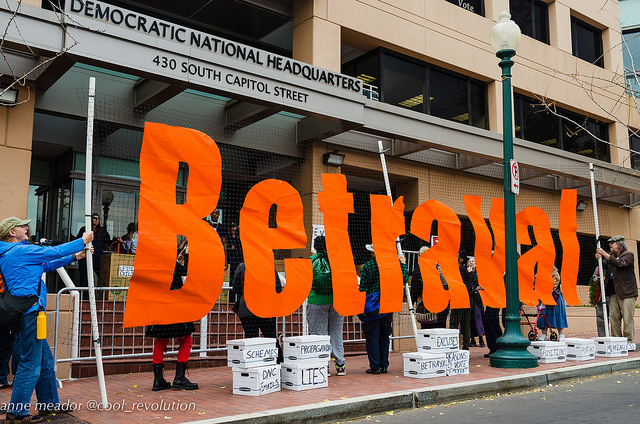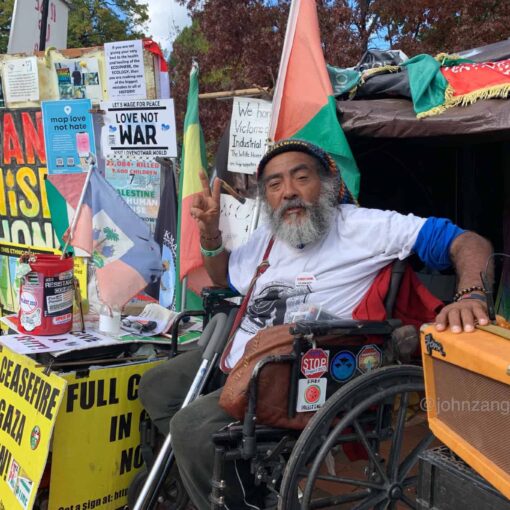by John Zangas
Three times in less than a week, anti-war protestors have flooded the sidewalks in front of the White House, demanding that President Obama step back from his plan to launch cruise missiles into Syria. Last Saturday, hundreds of demonstrators, both for and against the strikes, resisted police efforts to contain them. Reporters in the White House press pool said that chants of “No War on Syria!” even reached the Rose Garden, where the President announced he would take his case for attack to Congress.
Following an alleged chemical weapons attack on Syrian civilians, Obama has pressed for military intervention in Syria. A coalition of anti-war groups, including ANSWER Coalition, CODEPINK, Palestine Work Group, the Nation of Islam, and Veterans for Peace, have initiated protests against the “limited air strikes,” which they are convinced will escalate.
Brian Becker, director of Answer Coalition, said, “The American people, the people of the UK, and people of the Middle East don’t want another war.” He predicts that the U.S. will “spend millions of dollars to bomb Syrian people who only want to live in peace.”
President Obama has blamed the reported deaths of 355 Syrians and the “neurotoxic symptoms” of thousands of casualties in the Damascus region on the repressive al-Assad regime. A civil war has been raging in Syria for 2 1/2 years. Up to 2 million Syrians have fled the country.
Obama cites a moral imperative to act against al-Assad’s alleged use of chemical weapons, but Becker suspects that the U.S. has motives other than humanitarian concern for the Syrian people. The United States, said Becker, needs “nobles causes” as a “pretext for war.” Military and corporate interests take precedence in the Middle East, “because [that’s] where the world’s oil is.”
Becker also believes that the United States, “a unilateral superpower,” does not have a “legal or moral right” to attack Syria. “This is a war for empire,” he said. “If you look at the last decade, the American Government took out the Iraqi government, the Libyan government, and now they’re taking out the Syrian government.”
Tighe Barry of CODEPINK agrees, pointing to a long history of U.S. military intervention in the Middle East. “For the last forty years U.S. foreign policy has destroyed the Middle East by getting us into wars which have brutalized whole groups and populations–Palestinians, Bahrainis, Iraqis, and now Syrians.”
“The U.S. needs to limit its involvement in the rest of the world,” said William Blum, author of a book on U.S. military intervention around the world. “We don’t even know for sure that there was a real chemical attack. Or if there was such an attack, where is the evidence that the Syrian government was the perpetrator?”
At Tuesday evening’s White House protest, Tighe Barry wasn’t impressed by testimony at the Senate Foreign Relations Committee hearing earlier. “They were trying to sell us another war with zero evidence,” said Barry. “You could see the frustration [in] [Secretary of State John] Kerry’s body language.”
Kerry however convinced the Senate committee to pass the Authorization of Military Force resolution, which the full Senate will consider next week. The House Foreign Affairs Committee is debating a similar measure. If Congress authorizes use of force, it will go against 90% of Americans who don’t support missile strikes on Syria.
Obama also persists in plans to go it alone. Even as six U.S. warships and two aircraft carriers get into position in the Mediterranean Sea, most allies have forsaken the U.S. The United Nations and NATO will not support air strikes, and Britain’s prime minister failed to win over Parliament.
France alone is in favor of military intervention in Syria, with reservations. “Before acting we need proof,” said a spokesman for the French government.
Russia, which has sided with the al-Assad regime, opposes Obama’s push for a military campaign. “We have our ideas about what we will do and how we will do it,” said Russian President Vladimir Putin. “We have our plans.”
ANSWER Coalition and CODEPINK are planning a rally on Saturday, September 7 at the White House followed by a march to the U.S. Capitol.
CORRECTION: This article originally stated that the Assad regime had killed “approximately 100,000” Syrians, but there is some controversy over how civilian deaths are counted. According to The Atlantic, “their number probably includes some fraction of civilians who had taken up arms, which is to say, irregular rebel fighters, as well as a mix of pro- and anti-regime civilians. Pro-Assad fighting forces sustained 41 percent of total deaths since the conflict began…”

